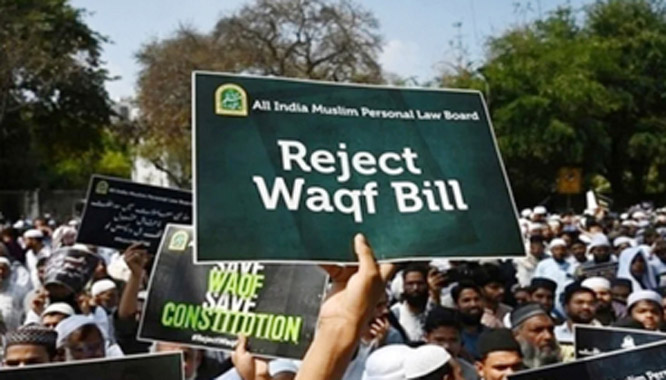
Online Desk: The controversy surrounding the newly enforced Waqf (Amendment) Act continues to fuel widespread protests across Uttar Pradesh, with more than 50 Muslims now facing legal action for voicing their opposition. The Uttar Pradesh police have responded by arresting and filing cases against protestors.
On 18 April, following the Friday noon prayers, a group of Muslims from Bilaspur village in Baghpat’s Singhawali Ahir police jurisdiction gathered outside the mosque to protest against the Waqf Act. Holding placards and banners, they chanted slogans demanding the repeal of the law. The protest, captured on video and widely circulated on social media, led the police to register cases against over 50 individuals, including 21 named and 35 unidentified individuals.
This crackdown is not an isolated incident. On 5 April, police in Muzaffarnagar also issued notices to 24 individuals who had opposed the legislation by wearing black bands, further intensifying the pressure on the Muslim community to stay silent on the matter. Additionally, these protestors were instructed to furnish a bond of ₹2 lakh each to avoid further action. One of the individuals affected by this order, Faizul Hasan, expressed his dismay: “We are being penalised for demanding justice. Why are we being punished for simply standing up for what we believe is wrong?”
The police have also issued notices to hundreds of others across districts such as Muzaffarnagar, Lucknow, and Sitapur, calling for bonds ranging from ₹1 lakh to ₹10 lakh. The notices have been directed at religious leaders and imams, individuals who are seen as potential instigators of these protests. While the legal measures continue to intensify, several leaders from within the Muslim community have condemned the actions of the authorities. “The state is not only targeting individuals but is also threatening the very fabric of our community’s unity,” said Maulana Akhtar, a prominent cleric from Lucknow.
This move by the Uttar Pradesh government comes amidst growing unrest over the Waqf Act, which critics argue undermines the autonomy and rights of Muslim communities to manage their religious properties. Protests have spread across the state, with significant demonstrations seen in cities like Kanpur, where youth activists gathered at the Jama Masjid on 12 April to show their discontent. The protests escalated when one young man attempted self-harm by dousing himself in kerosene during the demonstration, resulting in chaos and further police intervention. The authorities responded by registering cases against 24 protestors from the incident.
As the legal battles continue to unfold, the Waqf Act protests remain a sensitive issue, with mounting pressure on both sides of the debate. The government’s aggressive stance raises questions about the limits of freedom of expression, while the Muslim community faces continued repression in its fight for justice.





